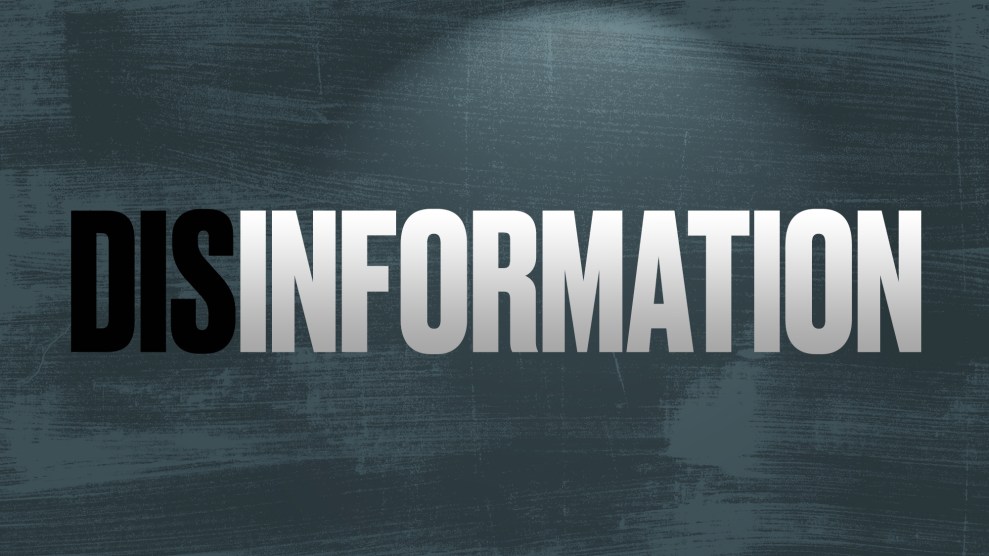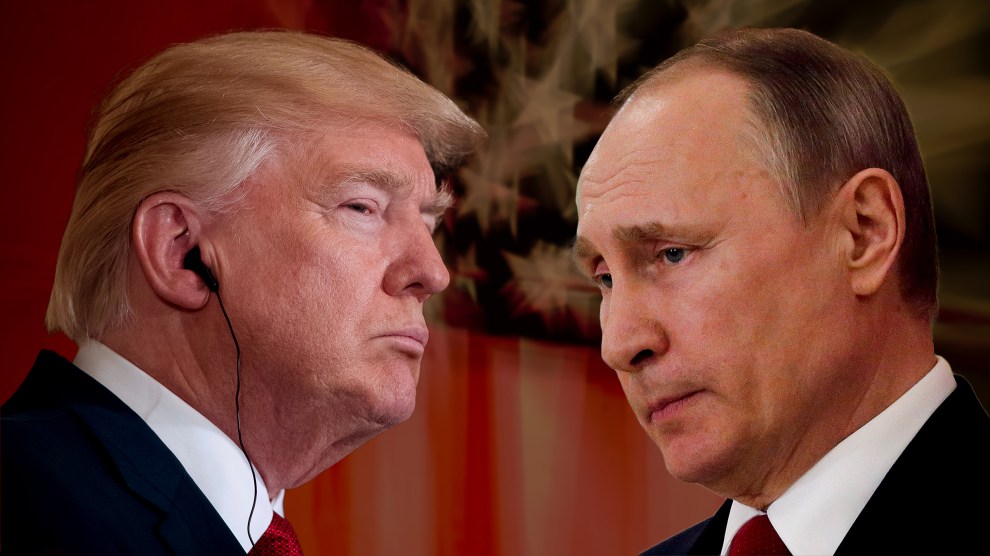We’re a long way from done processing the Mueller report—or, given how much has been redacted, from knowing what it really says. But one thing that’s clear now is that the questions it leaves open are about a lot more than the Russia scandal. They are about whether, with enough money and power, you can get away with undermining democracy and twisting the rule of law.
As our colleague Dan Friedman points out today, the report shows that President Trump used the authority of his office to prevent Mueller from coming to conclusions on many of the biggest issues. And it documents, to a degree we would find shocking if there were anything left we find shocking, that Trump deceived Americans time and again to further his financial and political interests. Consider this passage: “During the 2016 campaign…[Trump denied] any business involvement in Russia—even though the Trump Organization had pursued a business project in Russia as late as June 2016.”
That’s Mueller calling Trump out for lying. Flat out. Yet this president has been so successful in resetting the bar for scandal, it barely rated an “eh” from much of the political establishment.
MoJo Washington Bureau Chief David Corn calls this the “white tablecloth problem”: When you spill red wine on a clean tablecloth, it’s obvious and embarrassing. Spill on a tablecloth covered in stains and oh well, what’s one more?
But that doesn’t mean the tablecloth is clean. It means we need to back up and look at the whole thing.
The Russia scandal was never, in the main, about whether the president would be prosecuted for a crime. It was, and is, about a bigger issue: A wealthy politician who hoped to profit from pandering to a foreign autocrat put his own financial interests above those of his country, who abetted a foreign attack, and who lied about it to those he swore to serve.
There is a word for this, but it’s not collusion. It’s corruption. And rather than laying off investigating it, as too many are suggesting now, journalism needs to back up and look at the whole thing.
This is what we have been thinking about at Mother Jones as we plan for the critical 18 months ahead. What do you, our readers, need us to do to illuminate the full picture? What lies beyond the distractions? Where can our work have the most impact?
Here’s the idea we keep coming back to, and that we keep hearing from our readers, too: With apologies to Clinton ’92, it’s the corruption, stupid. And that’s not “corruption” in the narrow sense so often used in the media—basically, exchanging wads of cash in a dark alley. It’s about the bigger picture: a system that is consistently manipulated by those with money and power for their own gain.
Once you strip away the details, this is the pattern of so many of the stories of the moment: Tax cut (worth as much as $1.4 billion just to the Koch brothers, who claimed to have spent $20 million to help pass it)? Check. Promoting fossil fuels while America burns and drowns? Locking children and families in for-profit detention? Fiddling while the opioid crisis enriches billionaires? Check, check, check.
It’s an insidious phenomenon because it is self-sustaining: Autocrats and demagogues benefit from corruption, then run on a platform of fighting it, then take fuller advantage of it once in office. This did not begin with Donald Trump, but the full swamp flowering of his administration has made it plain to a point where people across the political spectrum now consider corruption one of the most significant dangers facing the nation. (More on this in a minute.)
So today, we’re announcing the Mother Jones Corruption Project, a push to do deep, time-intensive reporting on corruption as both the cause and the result of the crisis in our democracy. Our goal is to do the work to understand how we got here and how we might get out. Because like every crisis, this is also an opportunity—for clarity, transparency, and change.
This project is unlike anything we’ve done at Mother Jones, and we’re asking the MoJo community for donations to help us go big. But whether or not you can contribute right now, we owe you our plan, the reasoning behind it, and the way we believe this reporting can break through the chaotic headlines.
First, let’s take stock of where we are: The EPA is run by a former coal lobbyist. An ex-oil lobbyist heads the Department of Interior. Betsy DeVos, funder and champion of private religious schools, runs education policy. Steven Mnuchin and Wilbur Ross, billionaires who profited handsomely from the 2008 collapse, are in charge of protecting the economy. And at the Department of Justice, a top official who recommended that the federal government put more immigrants in privately-run detention centers hopped over to a job at the GEO Group, which pays immigrants $1 for a day of labor but can’t seem to find a way to prevent detainees from dying. No wonder the United States has plummeted in the corruption ranking maintained by Transparency International.
But if that all sounds grim, it’s not hopeless. First off, there is evidence that more and more Americans are diagnosing the problem. “Corrupt government officials” is the one concern that unites voters across the political spectrum, with polls showing it as one of Americans’ top fears. When the Kaiser Family Foundation added “corruption” to the list of topics respondents could peg as their biggest concern, it immediately shot ahead of health care and the economy. A pre-midterm poll by the progressive Center for American Progress found that 54 percent of voters in 48 Republican-held (!) districts said Republicans were more corrupt than Democrats. And a 2017 survey showed that the White House is considered the most corrupt institution in government.
These polls don’t ask people what they mean by corruption, and it’s a safe bet that some of it is in the eye of the beholder: Democrats may see abuse of power where Republicans see good policy and vice versa. What’s striking is that across the board, Americans feel that money determines politics and policy, and that this hurts them personally. This, you could argue (as our colleague Kevin Drum persuasively did in this piece on how economic inequality is directly correlated to the decline of unions and the dependence of both parties on Wall Street) is the problem underlying a lot of Americans’ economic anxieties. When it looks like every politician out there hobnobs with the mortgage companies and insurers that keep squeezing you, why would you trust that the system works for you?
The pervasive perception of corruption is exactly why so many people couldn’t stop talking about the college-admissions scandal earlier this year: It was an encapsulation of fake meritocracy. You tell your kids it’s all about working harder and being smarter—and then, just like that, you’re reminded that it’s not. Some folks are just too rich to fail.
But, and here’s where we come back to journalism, this is not the framework you see in most media coverage. Politics and policy are not, as a matter of day-to-day coverage, assessed with an eye toward who pulls levers and benefits economically.
There are different reasons why journalists don’t connect the dots—it’s assumed “people know this stuff,” it’s sometimes seen as editorializing—but the biggest one is that in the current media landscape, there’s little time or incentive to do this kind of reporting and analysis. The economics of news needs maximum eyeballs glued to screens at minimum cost.
This was a big problem in the 2016 campaign, when Trump’s business entanglements and the massive conflicts of interest they represented should have been a huge issue. Mother Jones‘ reporters were able to go after these stories—his enormous debt to the scandal-plagued Deutsche Bank, his Commerce secretary’s work with a Russian oligarch, the infamous Moscow business trip—but too much media coverage was consumed with the candidate’s bombastic statements and rallies.
And already, we see some of those same mistakes being made again: Election coverage obsessed with horse-race stories and fluff rather than the deeper forces shaping the race. That leaves the public less informed, which makes us more vulnerable to manipulation, which breeds more corruption: another self-sustaining cycle.
In the dictionary, “corruption” actually has two meanings. (1) “fraudulent conduct by those in power” and (2) “the process by which something [becomes] debased.” Like, for example, political norms. Expectations of our leaders, and of ourselves.
What we have learned in the past few years is that corruption at the top debases the entire system. Thus, underlings lying when they know that it’s expected of them. Thus, state politicians becoming more brazen in trying to lock in minority rule with voter suppression. Thus, researchers finding that Americans are tweeting more and more about “embarrassment,” “shame,” and “disgust.”
But here’s the flip side: You can only be embarrassed when you expect better, and those expectations have the power to fuel change.
Culture doesn’t just change in one direction. When enough people agree that something is a problem—say, marriage inequality or sexual harassment—a big shift can come quite suddenly.
But for enough people to agree on a problem, they need a framework for recognizing it as both systemic and subject to change. That’s why we aim to take on corruption as a phenomenon, not just as a series of individual scandals.
Tackling corruption systematically is a daunting challenge—but it’s also the one MoJo is equipped to take on like no one else. Our magazine was founded in 1976 to investigate the intersection of political and corporate power, or as co-founder Adam Hochschild once put it, to expose “the great unelected power wielders of our time.” And because as a nonprofit we answer only to you—not advertisers, wealthy owners, or investors—we can go after the stories that others won’t, and give our reporters the key ingredient to producing revelatory journalism: time. In 2017, readers helped us go deep on foreign influence when it was at risk of being swept under the rug. In 2018, you helped us add reporting capacity to investigate the role of tech platforms in exacerbating disinformation. You only need look at Dan Friedman’s and Ali Breland’s bylines to see what a difference that added firepower made: These reporters wouldn’t have been on the beat were it not for Mother Jones readers.
The Corruption Project will take more than $1.2 million to fully fund for two years, and we’ve mobilized seed funding to get started. But because we want to go all in, and suspect you feel the same, we’re looking to our readers to pitch in $500,000 so we can throw everything we’ve got at it—and do all the other reporting you expect of us, too. (We have something big coming next month that isn’t related to Trump or corruption but that we think you’ll agree is a vital story, too.)
It’s a big goal—way more than we typically raise during our spring fundraising drive—and we might not make it, but Mother Jones and our community have never been known for shrinking from a challenge. We’ll be making key budget decisions for this project and all of our 2020 election coverage, when our new fiscal year starts in July. The more resources we can muster by then, the deeper we can dig.
- Create a full-time reporting position dedicated exclusively to this issue. Every one of our breakthrough stories has come because someone was able to drill in and stick with a big project for as long as it takes.
- Build a team across our newsroom—research, graphics, data journalism, video storytelling—to bring the reporting to many audiences, from our print magazine to our Instagram account.
- Give the team space away from the daily scrum. The stories we investigate in the Corruption Project will not be published—except for scoops that just can’t wait—as part of the drip-drip of the news cycle. Instead, we’ll release them in a concerted fashion, making them harder to spin and less apt to feel like “oh well, another scandal.” This will include a special edition of our magazine, a series of videos from our award-winning multimedia team, a podcast series, and a dedicated online portal helping you navigate the full scope of the issue.
- Some of Mother Jones‘ best reporting has come from our growing community. We hope you’ll suggest ideas for us to dig into (just fill out the form below), give us feedback on the work as it happens, and share the reporting as widely as possible when it’s done.
- We’re also hoping to pull together some events that bring the MoJo community together and allow us to brainstorm what’s next.
- The reporting won’t stop with the 2020 election, but it will change direction: We hope to spotlight ways to clean up corruption and bring back public service.
Over the next 18 months, we have a unique opportunity to decide what kind of America we want. Beyond the wrangling over candidates and platforms, we will be deciding whether the United States should be run ONLY by and for those who can pay—or whether we’ll recommit to the promise, too often held back by inequality and injustice, of a democracy that welcomes all.
You know where we stand. And whether or not you can pitch in for this project, we are emboldened by knowing how many of you there are standing with us. Thank you.
Do you have ideas we could dig into, or an experience of how corruption affects you personally? Fill out the form below, or if you’d rather, send us an email at talk@motherjones.com, or leave us a voicemail at (510) 519-MOJO. If you have sensitive information to share, you can securely reach us here.
















